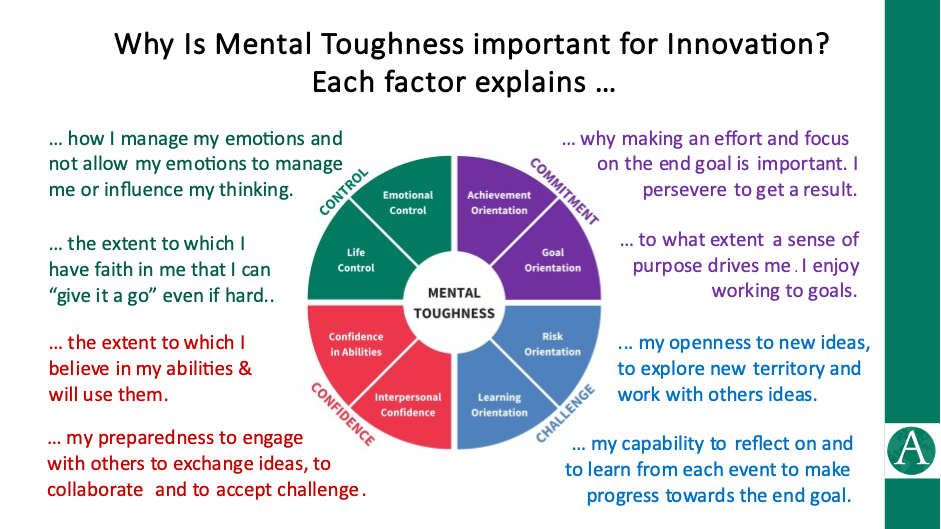Attitude
Attitude is a reasonable approximation to what we mean by mental toughness. Both are expressions of a mental approach to events.
A 2017 survey of over 500 organisations found that the quality that employers valued more than any other factor (qualifications, knowledge, etc) was attitude. However, hardly any were able to define it other than to say “you know it when you see it!”
The 4Cs mental toughness concept now enables us to understand what mental toughness/attitude are – it has 8 components which all matter. The MTQPlus measure is a remarkable psychometric measure which enables users to assess this in their clients – creating a unique level of self-awareness. It is therefore a valuable resource for anyone involved in people and organisational development.
One of the most commonly asked questions is “How can I develop this?”.
There isn’t an easy answer to this question but, for those who consciously wish to develop their mental toughness, we have identified 8 activities aligning with each of the 8 MT factors.
They also work for those who wish to develop strategies to deal with those moments when mental toughness is an advantage but they don’t necessarily want or need to change.
Taking the word ATTITUDE we have created a mnemonic describing what you can do to develop a mentally tough approach across all 8 factors. You can either learn to make these a part of you, or you can learn how to adopt tactics that enable you to deal with the regular ‘pinch points’ we all experience.
The ATTITUDE mnemonic
Assess opportunity (risk orientation): see the opportunity and reach for it. Manage your fear of stepping out of the comfort zone
Think about your purpose (goal orientation): what is important for your wellbeing and your success (and that of others). Set goals
Take charge of the things you can control (life control): belief in yourself as a worthwhile person who “can do” it.
Invest in and use your skillset (confidence in abilities): Build that belief in your knowledge, skills and capabilities.
Transact with others (interpersonal confidence): to ensure you are noticed and your voice is heard, that you influence and that you learn from others.
Understand what has happened (learning orientation): Learn from all that occurs – good and especially the bad, building capability and avoiding repeating mistakes.
Deliver what is important (achievement orientation): focus on key goals and avoid distraction. Be ready to make the effort.
Exercise calm (emotional control): maintain poise when needed and keep your emotions away from your actions and your decisions.
What would you add or replace?
The 8 factors in the mental toughness concept can be summarised thus:

These factors describe different aspects of the ”way we think” when things happen around us. This explains to a great extent our behaviour – “the way we act”- enabling us to understand better why we behave the way we do.
Each of us has a profile which is unique – and important to understand if we are to develop effectively.
We believe the mental toughness concept is one of the most important developments for practitioners – providing a remarkable resource to aid their work.
For information about becoming a licensed user of the MTQ suite of measures contact: headoffice@aqrinternational.co.uk
The MTQPlus measure is available in 14 languages, accessible to more than 2/3rds of the world’s population.
Completion of the AQR Licensed user training programme is recognised by EMCC and ICF for CPD purposes.


